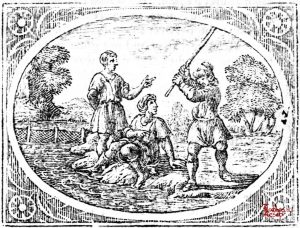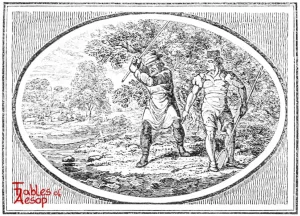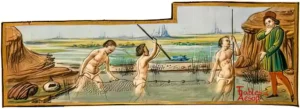A Fisherman roiled the water pulling in his net. People complained but he said he must roil the water or have no fish to eat.
Some never understand the actions of others.

JBR Collection (The Fisherman and Troubled Water)
A certain Fisherman having laid his nets in a river, took a long pole, and fell a-beating the water, to frighten the fish into his nets. One of the people who lived thereabout came and said to him, with surprise, “Why, what are you doing there, splashing and dashing the water about at that rate? You muddle the stream, and completely spoil our drink.” “Well,” replied the Fisherman, “all I know is, I must either spoil your drink, or have nothing to eat.”

Samuel Croxall (The Fisherman)
A CERTAIN Fisherman having laid his nets in the river, and encompassed the whole stream from one side to the other, took a long pole, and fell a beating the water, to make the fish strike into his nets. One of the neighbours that lived thereabout, seeing him do so, wondered what he meant; and going up to him, Friend, says he, what are you doing here? Do you think it is to be suffered, that you shall stand splashing and dashing the water, and make it so muddy that it is not fit for use? Who do you think can live at this rate! He was going on in a great fury, when the other interrupted him, and replied, I do not much trouble myself how you are to live with my doing this, but I assure you, that I cannot live without it.
THE APPLICATION
This fable is levelled at those who, as the proverb says, love to fish in troubled waters. There are some men of such execrable principles, that they do not care what mischief or what confusion they occasion in the world, provided they may but gratify some little selfish appetite. A thief will set a whole street on fire, to get an opportunity of robbing one house; an ill-natured person will kindle the flame of discord among friends and neighbours purely to satisfy his own malicious temper. And among the great ones, there are those, who, to succeed in their ambitious designs will make no scruple of involving their country in decisions and animosities at home, and sometimes in war and bloodshed abroad: provided they do but maintain themselves in power, they care not what havoc and desolation they bring upon the rest of mankind. They see all around them confounded with faction and party rage, without the least remorse or compassion. The widow’s tears, the orphan’s cries, and the sighs of despair itself cannot affect them. Like the Fisherman in the fable, they boldly pursue their sport, and only reply, it must be so, because we cannot live, as we would do, without it. What brutish, unsociable sentiments are these; such as a mere state of nature would scarce digest! Those that have any traces of equity in their brest, or any regard for the rights of mankind, should enter their protest against such notions as these, and oppose the practice of them with all their might and strength.

Thomas Bewick (The Fisherman)
A certain Fisherman having laid his nets in the river, and placed them across the whole stream from one side to the other, took a long pole, and fell to beating the water to make the fish strike into his nets. One of his neighbours seeing him do so, wondered what he meant, and going up to him, Friend, says he, what are you doing here? Do you think it is to be suffered that you shall stand splashing and dashing the water, and making it so muddy, that it is not fit for use? Who do you think can live at this rate? He was going on in a great fury, when the other interrupted him, and replied, I do not much trouble myself how you are to live with my doing this; but I assure you I cannot live without it.
APPLICATION.
This Fable is levelled at those who love to “fish in troubled waters,” and whose execrable principles are such, that they care not what mischief or what confusion they occasion in the world, provided they can obtain their ends, or even gratify some little selfish appetite. Little villains would set fire to a town, provided they could rake something of value to themselves out of its ashes; or kindle the flames of discord among friends and neighbours, purely to gratify their own malicious temper; and among the great ones there are those who, to succeed in their ambitious designs, will make no scruple of involving their country in divisions and animosities at home, and sometimes in war and bloodshed abroad: provided they do but maintain themselves in power, they care not what havoc and desolation they bring upon the rest of mankind. Their only reason is, that it must be so, because they cannot live as they wish without it. But brutish unsocial sentiments like these, are such as a mere state of nature would scarcely suggest; and it is perverting the very end, and overturning the first principles of society, when, instead of contributing to the welfare of mankind, in return for the benefits we receive from them, we thrive by their misfortunes, or subsist by their ruin. Those, therefore, who have the happiness of mankind at heart, (for happiness and morality are inseparably connected) should enter their protest against such wicked selfish notions, and oppose them with all their might; at the same time shunning the society of their possessors as a plague, and consigning their characters to the detestation of posterity.

L’Estrange version
A fisher-man had order’d his net, for a draught, and still as he was gathering it up, he dash’d the water, to fright the fish into the bag. Some of the neighbourhood that look’d on, told him he did ill to muddle the water so, and spoil their drink. Well (says he) but I must either spoil your drink, or have nothing to eat my self.
Moral
There’s no engaging the mobile in a sedition till their heads are so muddled first with frights and visions, that they can neither see, hear, nor understand.

Gherardo Image from 1480

Piscator Aquam Verberans
Piscator in fluvio quodam piscabatur. Extensis autem retibus et fluxu comprehenso utrinque, funi alligato lapide, aquam verberabat ut pisces, fugientes incaute, in retia inciderent. Cum quidam vero ex iis qui circa locum habitabant id eum facere videret, increpabat utpote fluvium turbantem et claram aquam non sinentem bibere. Et is respondit, “Sed nisi sic fluvius perturbetur, me oportebit esurientem mori.”
Perry #026


